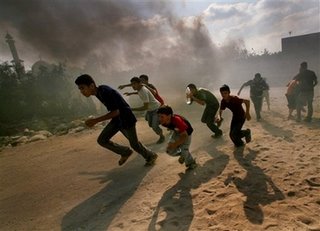Will Israel Free Palestinian Prisoners?

Palestinian youths run to avoid Israeli sniper fire during an Israeli army incursion in Beit Lahiya, in the northen Gaza Strip, Friday July 7, 2006. At least twenty-four Palestinians and one Israeli soldier were killed in fighting that broke out in the Gaza Strip after Israeli tanks and troops, backed by aircraft, seized control of a ribbon of land in the northern part of Gaza in an attempt to win freedom for a captured soldier and put Israel out of the militants' increasingly longer rocket range. (AP Photo/David Guttenfelder)
July 7, 2006
By SARAH EL DEEB, Associated Press Writer
GAZA CITY, Gaza Strip -Two weeks into Israel's violent standoff with Hamas, Israel sent conflicting signals Friday on whether it is prepared to swap Palestinian prisoners for a soldier whose capture by Palestinian militants has touched off a harsh military campaign.
Israeli troops killed 32 Palestinians in two days of air strikes and artillery barrages, Palestinian officials said. The campaign is aimed at stopping rocket attacks on Israel and pressuring the ruling Hamas movement to release the kidnapped soldier, Cpl. Gilad Shalit.
Israel's public security minister, Avi Dichter, suggested Friday that Israel is ready to cut a deal that would fall short of a direct prisoner swap.
Dichter said Israel could free some Palestinian prisoners as a goodwill gesture after Shalit is released and Hamas stops rocket attacks on Israel.
If there is calm, "Israel will need to, after some time, release prisoners as a reciprocal gesture," Dichter said. "Israel knows how to do this. Israel has done this more than once in the past."
He was referring to previous prisoner swaps — usually in deals that freed far more Palestinians than Israelis. Privately, Israeli officials have said they did not rule out talks in Shalit's case, either.
Moderate Palestinian President Mahmoud Abbas said he has won Israeli assurances that it would reciprocate for Shalit's release by freeing some prisoners, as well as Hamas politicians it has rounded up in recent days.
Officials close to Prime Minister Ehud Olmert later said Dichter's statement did not reflect the views of the government and that Israel insists on the soldier's unconditional release. However, the government did not issue a formal statement distancing itself from the minister.
Israel does not want to be seen as cutting a deal with Hamas militants, but also does not seem to have a way to free the soldier by force.
Hamas said Friday that Shalit, seized June 25, is alive and being treated well. It also urged Israel to negotiate. The Islamic militant group initially demanded the release of hundreds of prisoners, but then scaled back its demands, seeking freedom for some 150 female inmates and several dozen men serving long sentences.
The internal Israeli debate came as ground troops backed by tanks pursued militants in the streets of crowded Gaza towns, and aircraft struck northern Gaza.
Shalit is believed to be held in southern Gaza, and days after he was seized, Israel launched its biggest military campaign in the coastal strip since ending its 38-year occupation there nine months ago.
The incursion began in southern Gaza, then expanded Thursday to the north as troops seized control of a ribbon of land. On Friday, Israeli aircraft struck Palestinian gunmen in northern Gaza.
Palestinian health officials said a total of 32 Palestinians were killed over two days, including 24 on Thursday, in the bloodiest day of clashes since the renewed fighting began last week. An 11-year-old boy shot in the chest during fighting on Wednesday died of his wounds late Friday, Palestinian hospital officials said.
Egyptian mediators have proposed a two-stage deal in which Hamas would free Shalit and halt rocket attacks. In exchange, Israel would halt its offensive and promise to free some Palestinian prisoners in the future.
A Palestinian official close to the negotiations said Israel has agreed to the Egyptian formula, but wants the deal to be confidential, to avoid the impression of a direct prisoner exchange. Hamas wants the terms of the deal to be announced publicly, he said, speaking on condition of anonymity because the talks are confidential.
Israeli Cabinet minister Roni Bar-On, who is close to Olmert, said Israel would not negotiate with Hamas over the release of prisoners. However, his comment did not appear to contradict Dichter who also did not call for direct contact with the militants.
The fighting has compounded the misery that has deepened in Gaza and the West Bank since Hamas took power in March. International sanctions imposed to pressure the group to recognize Israel have rendered it unable to pay government salaries, but on Friday, Palestinian officials said about one-fifth of the 165,000 civil servants would receive a small down payment.
Government employees sustain about one-third of the Palestinians. Small down payments have been paid twice before.














0 Comments:
Post a Comment
<< Home